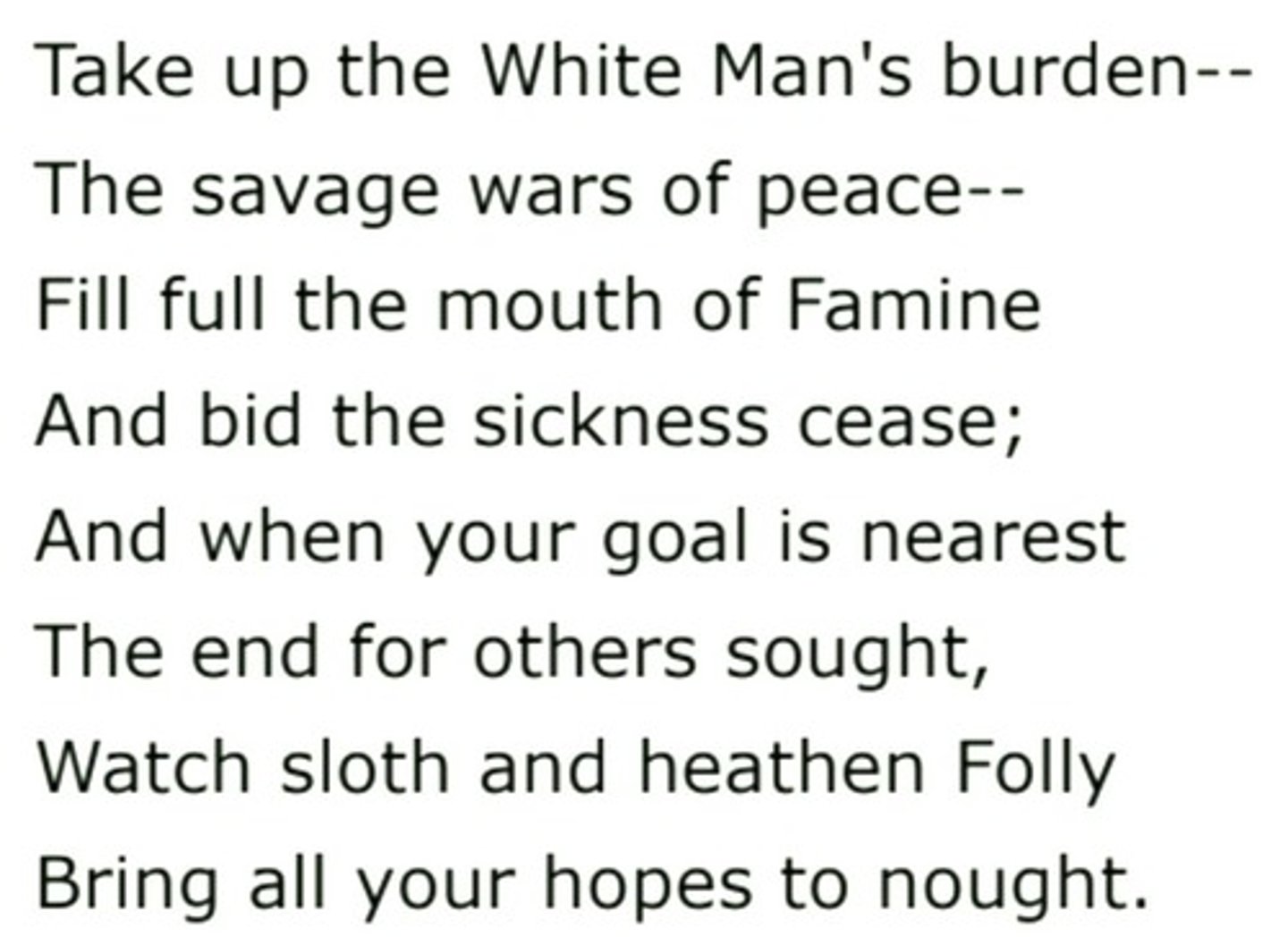Origins and Impact of US Imperialism and the Great Depression
1/285
There's no tags or description
Looks like no tags are added yet.
Name | Mastery | Learn | Test | Matching | Spaced |
|---|
No study sessions yet.
286 Terms
Frederick Jackson Turner
Historian known for the Frontier Thesis.
Frontier Thesis
Argument about American identity tied to westward expansion.
Industrialization
Economic transformation creating new jobs and products.
Post-Civil War Reconstruction
Period of rebuilding the South after the Civil War.
Mass Immigration
Large influx of people into the United States.
American Progress
Painting symbolizing westward expansion and civilization.
Manifest Destiny
Belief in the divine right to expand westward.
National Maturity
Growth phase of the United States post-revolution.
Alfred Thayer Mahan
Naval strategist advocating for a strong navy.
Naval Power
Importance of a strong navy for global influence.
Geopolitical Reasons
Strategic motivations for territorial expansion.
Economic Opportunity
Access to new markets and resources.
Religious Justification
Belief in spreading American values and faith.
Cultural Improvement
Efforts to enhance the lives of indigenous peoples.
Social Darwinism
Theory suggesting superiority of certain races.
Anglo-Saxonism
Belief in the superiority of Anglo-Saxon culture.
The White Man's Burden
Kipling's poem about imperial responsibilities.

Rudyard Kipling
Author of 'The White Man's Burden' poem.
Civilization Efforts
Attempts to educate and uplift indigenous populations.
Imperialism in Action
US territorial expansion in Central America and Hawaii.
American Fruit Companies
Firms gaining power over Central American governments.
Obligation of Empire
Sense of duty felt by imperial powers.
Resistance of Natives
Indigenous pushback against imperialist efforts.
European Observation
European nations monitoring American imperial activities.
United Fruit Company
Controlled plantations in Honduras and Guatemala.
Economic Imperialism
Dominance of one country over another's economy.
Annexation of Hawaii
US takeover of Hawaii for economic interests.
Bayonet Constitution
Revised Hawaiian constitution favoring sugar companies.
Queen Liliuokalani
Last monarch of Hawaii, overthrown by businesses.
McKinley
US President who annexed Hawaii after Cleveland.
Cuban Revolutionaries
Fighters seeking independence from Spanish rule.
Jose Marti
Cuban leader who inspired rebellion against Spain.
Maximo Gomez
Advocated destruction of plantations, labeled traitors.
Valeriano Weyler
Spanish general known for brutal tactics in Cuba.
Yellow Journalism
Sensationalist news to increase newspaper sales.
William Randolph Hearst
Media mogul promoting sensationalist journalism.
Joseph Pulitzer
Journalist known for yellow journalism techniques.
De Lome Letter
Insulting letter criticizing McKinley, intercepted by Cubans.
USS Maine
US battleship sunk in Havana harbor, escalating tensions.
War Hawks
Politicians advocating for military action against Spain.
Jingoism
Extreme patriotism favoring aggressive foreign policy.
Cuban plantations
Targeted by revolutionaries to weaken Spanish control.
Spanish-American War
Conflict driven by US interests in Cuba.
Hawaiian Sovereignty Movement
Ongoing effort to restore Hawaiian independence.
Cuban independence
Goal of revolutionaries to free Cuba from Spain.
Pressure on McKinley
Growing calls for US intervention in Cuba.
Press attacks Spain
Media coverage incites US public support for war.
Teller Amendment
Prohibits US annexation of Cuba post-war.
Spanish American War
Conflict between US and Spain in 1898.
American Navy
Prepared and launched invasion against Spain.
Victory in the Philippines
US naval success led by Commodore Dewey.
Rough Riders
Volunteer cavalry regiment led by Theodore Roosevelt.
Battle of San Juan Hill
Key US victory during Cuban campaign.
Platt Amendment
US retains control over Cuban affairs post-war.
Guantanamo Bay
Naval base established in Cuba by the US.
Imperialism Debate
Discussion on pros and cons of US expansion.
Pro of Imperialism
Military expansion enhances US global presence.
Con of Imperialism
Moral implications and potential for violence.
Manifest Destiny
Belief in US obligation to expand territory.
War in the Philippines
Brutal conflict with Filipino insurgents post-annexation.
Aguinaldo's Capture
Filipino leader's arrest ends major resistance.
Open Door Policy
US promotes equal trade access in China.
Spanish Navy
Outdated and poorly supplied during the war.
Cuban Government Rules
US imposes regulations on Cuba's sovereignty.
US Military Control
Maintained over Cuba until constitutional establishment.
Expansionism Morality
Debate on ethical implications of territorial acquisition.
US Influence in Central America
Gained significant power in several nations.
Concentration Camps
US employed camps during Philippine conflict.
Cuban Treaty Restrictions
Cuba forbidden from treaties without US consent.
Open Door Notes
John Hay's proposal for free trade in China.
Boxer Rebellion
Nationalist uprising against foreign influence in China.
Roosevelt Corollary
US intervention in the New World to maintain order.
Big Stick Diplomacy
TR's policy of using military threat for diplomacy.
Panama Canal
Strategic waterway built to connect Pacific and Atlantic.
Great White Fleet
US naval fleet showcasing power through goodwill tour.
Dollar Diplomacy
Taft's strategy of using financial influence abroad.
Moral Diplomacy
Wilson's approach promoting democracy and self-determination.
Militarism
Arms buildup and military expansion among nations.
Spheres of Influence
Regions where foreign powers hold exclusive rights.
Chinese Nationalists
Groups opposing foreign control and influence in China.
Christian Missionaries
Religious groups causing resentment during foreign intrusion.
Economic Downturn
Decline in China's economy leading to nationalist anger.
Colombian Refusal
Colombia's rejection of US offer for canal construction.
Panamanian Rebellion
Uprising supported by US to create Panama.
US Troops in China
Military intervention to suppress Boxer Rebellion.
Taft's Successes
Effective policies in Central America and Caribbean.
Taft's Failures
Ineffective policies in China and Dominican Republic.
Wilson's Imperialism Opposition
Wilson's belief in self-determination for all nations.
TR's Mediation
Negotiation between Japan and Russia to end conflict.
Conscription
Mandatory enlistment for military service across nations.
Economic Influence
Using financial power to gain political leverage.
Military Expansion
Germany and France doubled armies (1870-1910).
Naval Race
Competition between Germany and UK for naval supremacy.
HMS Dreadnought
1906 British battleship revolutionizing naval warfare.
Bismarck's Alliance
Germany allied with Austria-Hungary for security.
Triple Alliance
Germany, Austria-Hungary, and Italy's military agreement.
Triple Entente
Alliance formed by England, Russia, and France.
Balkan League
Greece, Serbia, Montenegro, Bulgaria unite against Ottomans.
Imperialism
Competition for colonies led to European tensions.
Nationalism
Strong national pride influenced European countries' actions.